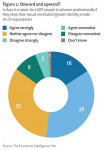Global CMOs must remake marketing operations, counsels a new Economist Intelligence Unit report
Firms are responding to the fact that consumers have many sources of information and are becoming more sophisticated in their purchasing decisions. “Now when you push a marketing message out there, something comes back. If it’s a great message, if it resonates and it’s real, the boomerang is going to be positive. But if it’s off message and it’s not genuine, or if it’s perceived as being disingenuous, you get slammed,” says Lauren Flaherty, CMO of Canadian telecommunications company Nortel Networks, an interviewee for the report.
CMOs continue to face the difficulty of measuring effectiveness, return on marketing investment and relevance to the business. Now, the widespread dissemination of information is causing global CMOs to adopt a broader role by engaging all corporate stakeholders—not only their traditional audience of customers and prospects, but also investors, employees, government regulators and others. This often entails integrating marketing and communications into all aspects of the enterprise in order to gather, develop and use customer intelligence.
“The CMO of the future must be the chief proponent of close engagement with customers,” says Nigel Holloway, Director, Americas, Industry and Management Research, at the Economist Intelligence Unit. “Rather than merely pushing out the corporate message to consumers, marketers must draw them in so that they are regarded as helpful participants in the development of the brand."
Other key findings of the report include the following:
• Balancing global brand awareness with local market relevance. Centralising global marketing functions, such as advertising development and production, can create economies of scale and save money, but they must be guided by the needs of the local market. At the same time, marketing budgets must be decentralised so that regional directors can make appropriate decisions based on market demands.
• Integration of marketing with other forms of corporate communications. Both the interactive nature of Web 2.0 technologies and the transparency of corporate messages among different constituencies require the integration of various forms of marketing and communications. Businesses can no longer segment audiences and messages as if audiences don’t talk to each other.
• Adopting new media. Companies should consider setting aside a specific budget for experimenting with the newest Web 2.0 technologies. The CMO should have the foresight to anticipate how different constituencies will respond to different events, messages and channels, and should be able to deal with the proliferation of new-media tools and expanded audiences.
• Developing new skills, capabilities—and partnerships. CMOs must understand the fundamental business model, brand, culture, policies and values of the organisation. Equally important in terms of adapting to the evolution of new media are partnerships with vendors whose expertise can be used to take new initiatives to market faster—and more effectively—than a company would on its own.
About the survey
The research is based on a global survey of 263 marketing executives conducted in February 2008. Of the respondents to the survey, 30% held C-level titles. The sample was also far-flung: 35% were based in Western Europe, 29% in Asia-Pacific and 20% in North America, with the remainder coming from Eastern Europe, Middle East, Africa, and Latin America. Respondents hailed from nearly 20 industries and all had annual revenue of US$500m or more
About the Economist Intelligence Unit
The Economist Intelligence Unit is the world leader in global business intelligence. It is the business–to–business arm of The Economist Group, which publishes The Economist newspaper. As a provider of country intelligence, we help executives make better business decisions by providing timely, reliable and impartial analysis on worldwide market trends and business strategies. More information about the Economist Intelligence Unit can be found at www.eiu.com.
웹사이트: http://www.eiu.com
연락처
Joanne McKenna
Press Liaison
Economist Intelligence Unit
26 Red Lion Square
London
WC1R 4HQ
UK
Direct: +44 (0) 20 7576 8188
Sales: +44 (0) 20 7576 8181
Switchboard: +44 (0) 20 7576 8000
email: 이메일 보내기
이 보도자료는 Economist Intelligence Unit가(이) 작성해 뉴스와이어 서비스를 통해 배포한 뉴스입니다. 뉴스와이어는 편집 가이드라인을 준수합니다.




